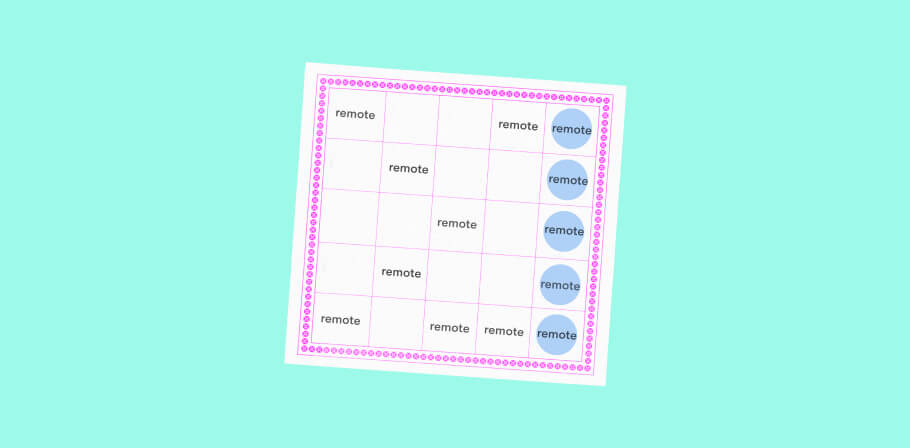Whether you're a remote-first company like Basecamp, or you've recently switched to remote work, the issue of keeping your team engaged stays relevant.
In fact, 20% of more than 3500 surveyed remote employees stated that collaboration and communication are the biggest challenges when it comes to working remotely. Another 20% of respondents named loneliness as their reason for concern.
As you can see, keeping your remote employees engaged and involved in a company's culture, and building transparent communication must be your top priority.
We've studied the experience and best practices of renowned tech companies that manage remote teams with grace and ready to share our insights.
Common challenges of remote team communication
From the moment your employees leave the office, the following issues might occur:
- Challenge of keeping up with large and complex projects. In-person communication and the ability to resolve issues without long emails and video conferencing speeds up the resolution of conflicts and other issues.
- Supervision from project managers. Since managers can't see people working in the office, a sense of mistrust may occur.
- Team's disengagement. Keeping people engaged and promoting corporate culture is a challenge when there's a lack of in-person contacts.
- Lack of transparency in communication. Miscommunications and misinterpreted messages occur when a team switches to written communication.
- Distractions at home. From a bad internet connection to a child making noise in the background – all these distractions make remote work counterproductive.
How to boost communication when working with remote teams
1. Create a supportive environment
A recent survey by Ernst & Young revealed that 39% of US workers feel happier with regular check-ins from their managers. With remote communication, it's the same.
Here's how you can build transparent and supportive communication even working remotely:
- Allocate time in your calendar for regular 1:1 meetings, so everyone can schedule a time slot to talk about professional development, recognition, or any other actual topics.
- Offer an Employee Assistance Program that helps with childcare, house cleaning, legal issues, and other personal issues. With assistance programs, you can help your employees free up busy schedules, focus on important tasks, and feel that you care.
- Create themed chats or Slack channels for different purposes: whining, asking for help, or saying thanks to colleagues. Why get a variety of chats? Because the issue will be brought up within a specific group of people, not company-wide. Such an approach stimulates people to communicate and resort to help timely.
2. Come up with communication rules
Remote communication requires excellent self-organization and motivation skills. To aid your employees, consider setting up communication rules:
- Set a timeframe for communication. One of the common issues of remote work is overtiming and late meetings. To avoid employee burnout, set the time frame when it's appropriate to have a meeting or a call with a colleague. After the working time, employees switch to the "Mute" mode and aren't available.
- Prepare in advance. Treat your online meetings just like in-person ones. To boost productivity, consider bringing in the role of a moderator, and curate the meeting. A clear agenda, a minutes of the meeting, and follow-up afterward come in handy for colleagues that are late or can't join the meeting.
- Manage timing. To avoid time overrun, build your meetings according to the Minto's pyramid. Start with introducing the agenda and points for discussion, then move on to the most important points, and leave the lowest priority issues for the end of the meeting. It's better to leave small talks for the beginning of the meeting when everyone is gathering and often being late. Or, you can have a casual chit chat at the end of the meeting, if you see you have enough time left.
3. Reap benefits of written communication
At Basecamp, most of the communication is written. They believe it's the key to considered decision making, productivity, keeping everyone in the loop of the latest news, and avoiding miscommunications.
Basecamp isn't the only evangelist for written communication. Amazon's top management writes reports and essays instead of PowerPoint presentations. Besides, the CEO, Jeff Bezos, writes an annual letter to Amazon's stakeholders. Bezos thinks that writing essay disciplines makes people think creatively and get the essence of the message.
If you opt for written communication like emails or chats, make sure everyone knows the rules of the game. For example, Basecamp recommends long-form writing like emails, avoiding group chats in order not to distract too many recipients at a time, the brevity of message, and get rid of the "ASAP" culture.
Productive communication habits of remote teams
Some teams excel in remote communication. How? They make a habit or a ritual to keep everyone engaged in the company's life and make communication transparent and effortless. Let's see a few examples of such habits.
1. Random virtual coffee with teammates
Automation is everything when it comes to connecting teammates. One of the brightest examples is a Slack chatbot Donut that will help you gather teammates around a virtual water cooler. The chatbot randomly chooses two teammates and creates a closed channel they can schedule a call and have a casual chat.
Such remote-first companies as Buffer and Automattic use Donut to enhance employee experience and help teammates get to know each other with a bit of fun and unexpectancy.
2. Regular check-ins with the team
According to recent research, around 46% of the US respondents revealed that the most successful managers are the ones that conduct frequent check-ins in the form of daily or 1:1 meetings. Checking in with your team morale is just as important as daily meetings to check work statuses. To build a supportive, trust-based working environment, consider the questions from the list below:
"How do you feel?"
"What challenges keep you from moving forward?"
"What do you think can help you do better?"
"What part of work do you enjoy the most?"
"How do you relax after work?"
Asking these questions helps you find out obstacles that prevent employees from achieving the company's goals, demonstrate that you care, and study employee's motivation.
You can also modify the form of a questionnaire to checklists, anonymous polls, or quick surveys when employees can grade their welfare on a scale from 0 to 10.
3. Internal communications
85% of employees reveal that they stay motivated when management keeps them posted on company's updates and changes. Moreover, regular internal communications help you keep everyone on the same page, share knowledge, and keep necessary information like corporate rules at hand.
Here's how you can boost internal communications within a remote team:
- Gamify. Interact, an intranet communications company, launched an internal rewards system for its employees. Employees exchange virtual points (called "donuts") that can be converted into tangible rewards from Amazon. Such an approach is a fun way to promote a culture of recognition and encourage employees to give back.
- Create a culture of feedback. Corporate communications is a two-way street. In fact, employees who feel that their feedback is taken into account by the company's management, are much more motivated to perform at their best. To encourage employees to share what's on their mind, opt for secure tools like Slack chatbots and polls that don't gather names and employee data. Prepare for implementation of some proposed changes – otherwise, your efforts will be in vain.
- Keep away from spam. No need to inform the whole company about a newcomer in a team. Stick to the schedule with a company's newsletter and leave spontaneous messages for significant occasions.
4. Celebration of special moments
Recognizing employees' and company's successes brings people together and boosts the level of belonging to something important.
ShieldGeo's team decided to go further and share special personal moments of their employees. During the onboarding stage, newcomers are asked to share the dates of their achievements, milestones, or holidays they celebrate. With the help of a Zapier chatbot, people in a company figure out that David celebrates Hanukkah today and Emma doesn't mind some chewy gift for her puppy's birthday.
At Basecamp, a remote-first company, employees celebrate accomplishments with Heartbeats. Heartbeats is a report of what the team has done and achieved during the last 6 weeks written by a team leader. Since Basecamp relies on written communication 90% of the time, it's a way to keep consistency in corporate communications and get a reason to rejoice.
Wrapping up
A successful remote team communication relies on principles of openness, regular check-ins, and cultivating a feeling of belonging and recognition. The only difference between remote and traditional team communication lies in choosing workable tools that'll help you achieve your goals. Keep up with our blog updates for even more useful content!

As Chief Editor, Darya works with our top technical and career experts at EPAM Anywhere to share their insights with our global audience. With 12+ years in digital communications, she’s happy to help job seekers make the best of remote work opportunities and build a fulfilling career in tech.
As Chief Editor, Darya works with our top technical and career experts at EPAM Anywhere to share their insights with our global audience. With 12+ years in digital communications, she’s happy to help job seekers make the best of remote work opportunities and build a fulfilling career in tech.
Explore our Editorial Policy to learn more about our standards for content creation.
read more





















